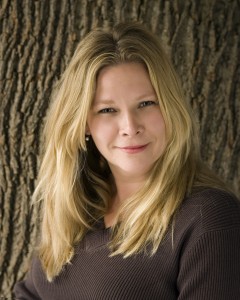Chris McCurry of Highland Craftsmen, Inc.
By Alli Marshall
It was the old chestnut-bark siding that provided the inspiration. Though the chestnut blight has destroyed mature American chestnut trees, Chris McCurry wondered why the once-popular shingles couldn’t be duplicated in poplar.
“We wanted to reintroduce something indigenous and match the culture; we wanted the buildings to fit the area,” she explains. So, McCurry and her husband Marty co-founded Highland Craftsmen, Inc. in Spruce Pine, N.C.
Highland Craftsmen has been manufacturing Bark House Shingles since 1990, and today the company offers reclaimed white pine panels, bark laminates, natural moldings, handrails and wooden slabs.
Highland Craftsmen has two criteria for the materials they use: they must be sourced locally and must be a waste product of the forestry industry.
“If people have a tree that needs to be removed [due to disease or because of construction], they know they can bring it to us,” says McCurry.
Her company has the expertise to properly dry and treat such wood so that an unsuspecting homeowner won’t later face shrinkage, rot, or worse, insects. “We know which products will fit into a certain application — there’s a lot of thought and service behind that.”
There is a lot of thought behind Highland Craftsmen’s pledge to environmentalism, evidenced by a B Corporation Cradle to Cradle gold certification— a multi-faceted green designation that evaluates a product’s safety to human beings and the environment, as well as to future life.
McCurry isn’t just about making and selling bark shingles, she is about economic revitalization and building a strong local community. McCurry is Vice President of the Spruce Pine Main Street board, which fosters economic restructuring. The board has involved the University of North Carolina’s Kenan-Flagler STAR (Student Teams Achieving Results) program to evaluate potential business opportunities; McCurry herself has a background in group facilitation and collaborative efforts.
“We’ve suffered a lot through fire and job loss,” she says of the town. “Facilitating so other people can have their voice: There’s huge hope in that.”
Jennifer Woodruff of Build it Naturally
By Alli Marshall
Build It Naturally owner Jennifer Woodruff developed an environmental mindset early in life. Her parents recycled before recycling was fashionable. Woodruff grew up composting, organic gardening, canning food and dyeing wool from the sheep on her family farm.
The seeds for an Asheville-based green building store were planted when, as an MBA student in a California-based Environmental Entrepreneurship program, Woodruff landed a job at the Natural Home Design Center in Santa Rosa. Woodruff was impressed by both the growing green building supplies market and by the business practice of her employer “based upon a triple bottom-line that considers people, the planet, as well as profits.”
Woodruff opened the first Build it Naturally showroom in 2006, and moved to its current location in the autumn of 2007. The company specializes in products for people who suffer from chemical sensitivities or just don’t want to introduce toxins to their homes.
The store stocks items like green flooring made from bamboo, cork, pine resin and reclaimed wood; concrete countertops from sand and gravel collected through low-impact dredging; Paperstone countertops made of 100-percent post-consumer recycled paper; and natural cotton-fiber denim (that’s right, discarded jeans!) refashioned into chemical-free insulation. They also offer water-based paints made from natural ingredients like plant dyes, essential oils, natural minerals, milk casein and bees’ wax.
That Woodruff parlayed a green upbringing into a green business is a great story in itself, but here’s a nice addendum: On her National Association of Professional Women profile, Woodruff lists Habitat for Humanity as “the charity that I am most passionate and drawn to.” Makes sense.
Related Articles
Latest News

Leave a comment
Your email address will not be published. Required fields are marked *







Leave a Comment